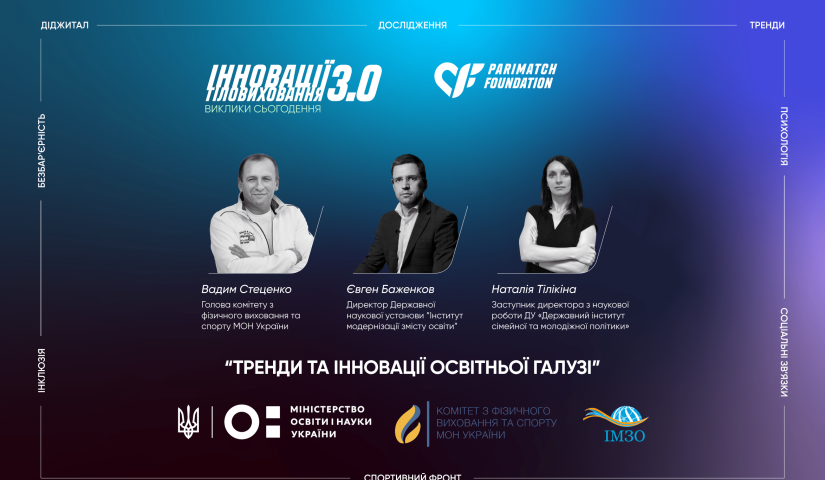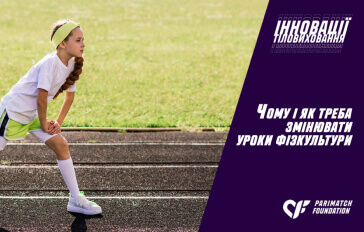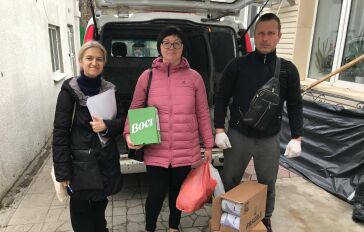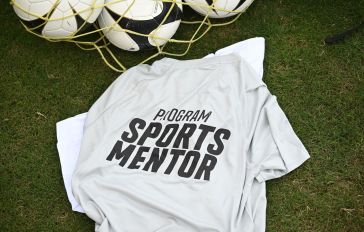
Experts spoke about the results of the work of physical education specialists and plans for 2023 at the annual international conference of the Parimatch Foundation “Innovations of physical education 3.0. Nowadays challenges”.
Despite the blackouts and air raid alerts that continue in Ukraine on a daily basis, at the end of October, the international charitable foundation Parimatch Foundation held an online conference for experts in the educational field — “Innovations of physical education 3.0. Nowadays challenges”. Six hours of discussion of priority issues, 21 speakers, including representatives of international organizations, the Ministry of Education and Science of Ukraine, professional trainers, honored teachers of Ukraine, winners of the teacher-innovator competition, international experts and athletes. More than 5,000 views for one goal — to unite active teachers, coaches, sports representatives, parents and guardians, as well as the sports community to track trends and find new solutions for the physical education of children. The educational online conference has been implemented for the third year with the support of the Ministry of Education and Science of Ukraine, the Institute of Education Content Modernization and the Committee on Physical Education and Sports of the Ministry of Education and Science of Ukraine.
How to adapt physical education classes to difficult current conditions? What new approaches are emerging among teachers today? These topics were discussed by the experts in physical education in Ukraine during the conference in the “Trends and Innovations in the Education Industry” block.
In what way have sports events in universities and schools changed during the war
Vadym Stetsenko, Chairman of the Committee on Physical Education and Sports of the Ministry of Education and Science of Ukraine
Temporarily displaced children and children who are currently abroad need new approaches to sports activities. But the suspension of physical activity is certainly not an option. Our goal was, despite the difficult military situation in the country, to continue to be active in organizing sports events for children and youth.
Seminars and webinars on how to work with children now, how to support and motivate them, were the first formats of events for physical education teachers already tested during the pandemic.
The second important task with an asterisk was to ensure the participation of our pupils and students in international competitions. Because these are also victories, but on the sports front. Despite problems with financing and obtaining permits for athletes and coaches to travel abroad, as well as difficulties in logistics, Ukrainians have something to be proud of.
- 2nd place at the Futsal World Championship — the Brazilian team took the 1st place;
- 3 silver and 2 bronze medals at the World Championships in Kayaking and Canoeing in Poland;
- 11 gold, 18 silver, 19 bronze medals and 7th place among the teams of 53 participating countries at the World Summer Gymnasiade in France. Our students were represented in all 17 sports.
Next, instead of holding sports events offline, the task was to organize online activities. We have created challenges, online marathons and flash mobs for pupils and students from 25 regions of Ukraine. More than a thousand institutions and thousands of participants took part in a patriotic flash mob dedicated to the defenders of Ukraine: everyone did the burpee exercise and thanked the defenders of Ukraine.
However, in addition to online events, we still managed to hold competitions in three sports within the framework of the All-Ukrainian Gymnasiade and in one sport within the Universiade.
Plans
Thanks to the support of the Parimatch Foundation, we plan to introduce a single platform for all professionals, where they will be able to receive information on the topic of physical education and sports. We are currently working on it and will launch it soon.
Preparation for the Cool Games event in the Lviv region among the students who are children of the defenders of Ukraine (13-16 years old). Preparation for participation in the World Winter Universiade and World Summer Gymnasiade in January and February of 2023.
Participation in the European University Games in Poland and the World Cup among students in martial arts in Turkey.
What has changed in the new physical culture at the level of state policy
Yevhen Bazhenkov, director of the Institute of Education Content Modernization, candidate of sciences in physical education and sports, honored worker of physical culture and sports of Ukraine
What should the class of modern physical culture in schools look like? This is the main issue that we have been working on since 2021.
The pilot classes that began last year have had a positive experience and, with the amendments made, we have approved a model program with 60 variable modules. The modules are adapted to physical culture, age categories and sports that a teacher can choose for physical culture classes. But most importantly, during the approval of the basic secondary school standard, we succeeded in getting the area of physical culture into a separate educational sector. And this is a victory and the foundation based on which a new modern physical culture is being developed at school.
Specific features of the model program:
- It was created not by scientists and theorists, but by the whole country. It was joined by public organizations, sports federations, the Ministry of Sports and Youth of Ukraine, the All-Ukrainian Center for Physical Health of the Population “Sports for All”, as well as the institutions and stakeholders interested. Its main task is to increase the motor density of the class and modify physical culture classes to comply with modern standards, as well as to make them interesting for children.
- The program has been worked out practically: dozens of trips, meetings and practical seminars with more than 6,000 physical education teachers.
- A new model has been built for the classes, taking into account different fitness levels and different health groups of students. This program makes it possible to combine several modules in one physical culture class, depending on the available material and technical base in the educational institution and according to the wishes of students and parents, as well as the qualifications of the teacher.
Plans
Together with the Parimatch Foundation, we plan to create a physical education textbook for teachers in early 2023 with a description of 60 variable modules and interactive links. In this way, the specialists will have something like a road book at hand for reading it themselves, studying the rules and choosing basic exercises for practical work. This manual will be published and sent to each physical culture teacher personally.
The second project is «Healthy Ukraine» (working title). These should be competitions in the form of a game with more focus on an active lifestyle and communication, which include intellectual and cultural competitions, and not exclusively sports. The idea is to create such a social phenomenon as student leagues.
Study of the role of sports and physical activity in the life of a child and family
Nataliia Tilikina, Deputy Director for Research at the State Institute of Family and Youth Policy
In August, the Parimatch Foundation and the Ministry of Sports and Youth Policy of Ukraine launched the first all-Ukrainian study on the level of involvement of children in sports and its impact on physical and mental health. It will last five months. It was initiated by an international charitable foundation. The partners and implementers of the initiative were state institutions subordinate to the Ministry of Sports and Youth Policy of Ukraine — the State Institute of Family and Youth Policy and the All-Ukrainian Center for Physical Health of the Population “Sports for All”.
Our study aims to examine the level of physical activity and its impact on children and youth affected by the war in Ukraine. We study the dynamics of changes in the state of physical and mental health of children over the past five years. And now we are also studying the impact of the Russian full-scale invasion on the level of involvement of children in physical education and sports. As well as what factors limited access to sports activities until February 24, 2022, and after, and what were the priority needs for sports before martial law in the country, what are they now and what will be after.
We are also studying international experience in the use of sports for rehabilitation. And our goal is, based on all this data, to develop proposals and recommendations for specialists in the rehabilitation of children.
Target groups of the study: experts in the field of physical culture and sports, teachers of physical culture, coaches of sports sections, children and youth aged 10-16, as well as parents of children of the age group of 6-16. The research methods were in-depth interviews, online surveys and desk research. We had about 9,000 respondents in eight regions: Kyiv, Rivne, Odesa, Lviv, Vinnytsia, Poltava, Ivano-Frankivsk and Zhytomyr.
It can already be said that, according to the coaches, the children’s state of health has deteriorated over the past six months. The majority of parents are confident that the physical condition of their children has not changed. Children, on the other hand, assess their own physical health more positively. Every fifth is sure that it has improved and every second is sure that no changes have taken place. Among teachers and coaches, the top three changes cited were poor school performance, anxiety disorder and pessimistic outlook on life by the children. Among parents and children, this is predominantly a deterioration in school performance, but also sleep disturbance, problems with appetite and manifestations of aggressive behavior.
In the near future, we plan to conduct accurate analytics, prepare an analytical report on the results and develop recommendations.
The results of the study will have a long-term effect on the formation of state policy in the field of physical culture and sports, as well as in the field of healthcare, youth and social policy, and in the field of education. What is more, they will provide a development vector for future projects and programs, and, as we hope, for national changes initiated by the state.






